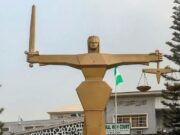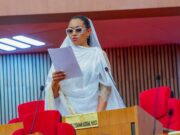The Senate has successfully passed the N49.7 trillion 2025 Budget for its second reading.
The decision was made on Thursday during plenary after extensive discussions on the general principles of the budget.
Senators commended President Bola Tinubu for his positive intentions for the nation, agreeing on the need for the proposed fiscal measures.
Following a voice vote presided over by Senate President Godswill Akpabio, the budget was referred to the Committee on Appropriations, which is chaired by Senator Solomon Adeola.
President Tinubu had introduced the 2025 Budget of Restoration to a joint session of the National Assembly the previous day.
The budget aims to foster peace and prosperity, with a revenue target of N34.82 trillion to cover the total expenditure of N47.9 trillion.
The proposal includes a budget deficit of N13 trillion.
Key allocations in the budget include N4.91 trillion for Defence and Security, N4.06 trillion for Infrastructure, N3.5 trillion for Education, and N2.48 trillion for Health.
Debt servicing has been allocated N15.81 trillion, while several assumptions underpin the budget, including oil production of 2.06 million barrels per day, an exchange rate of N1,500 to the US dollar, and an inflation rate target of 15%, a significant reduction from the current rate of 34.6%.
In his address, President Tinubu highlighted the bold direction of the proposed budget, saying, “Our 2025 budget proposal represents a clear vision to transform the socio-economic structure of our society.”
He also emphasized that the budget would reduce inflation and improve the exchange rate.
“We are targeting ₦34.82 trillion in revenue for the year, with government expenditure set at ₦47.90 trillion, including ₦15.81 trillion for debt servicing. The projected deficit of ₦13.08 trillion amounts to 3.89% of GDP,” Tinubu said, outlining optimistic economic projections.
The president also noted that economic reforms under his administration are yielding positive results, citing a 3.46% growth in the economy in Q3 2024 compared to 2.54% in Q3 2023.
Furthermore, he reported that Nigeria’s foreign reserves had increased to nearly $42 billion, which strengthens the country’s financial stability against global economic pressures.

















